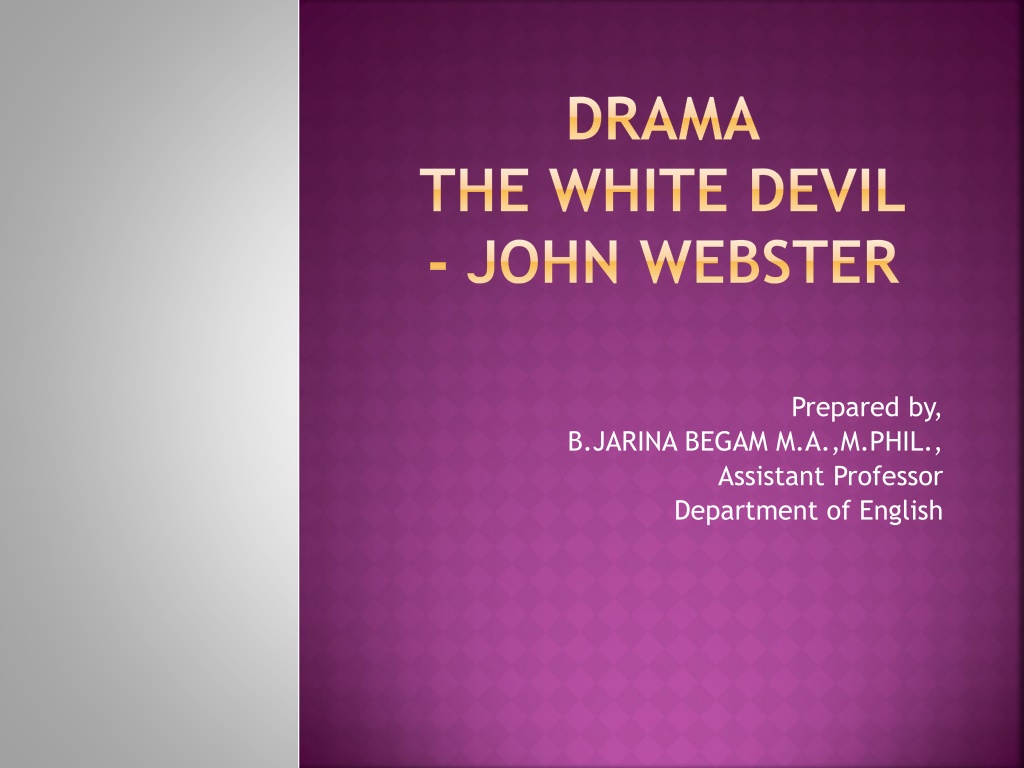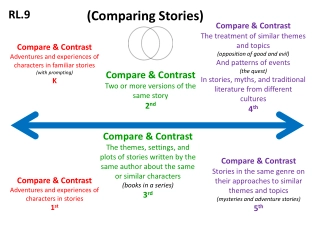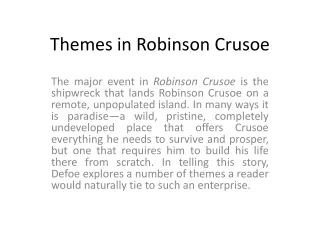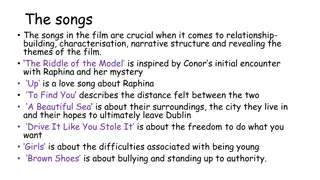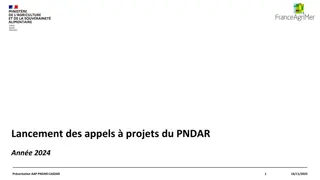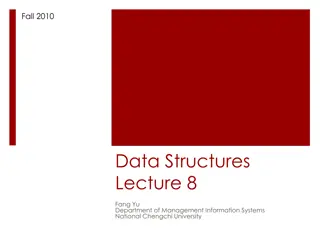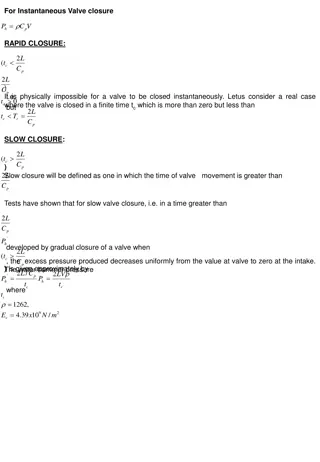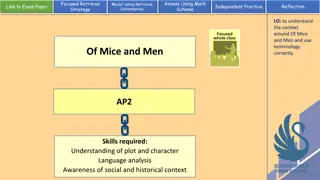Analysis of John Webster's Play "The White Devil" and Its Themes
John Webster's play "The White Devil" is a revenge tragedy that explores themes of revenge, retribution, and cyclical nature of vengeance. The complex characters, intricate plot, and genre-bending elements make it a significant work in English literature, despite initial poor reception. The play delves into dark human emotions and the consequences of seeking revenge, portraying a web of deceit, murder, and ultimate tragedy.
Download Presentation
Please find below an Image/Link to download the presentation.
The content on the website is provided AS IS for your information and personal use only. It may not be sold, licensed, or shared on other websites without obtaining consent from the author. Download presentation by click this link. If you encounter any issues during the download, it is possible that the publisher has removed the file from their server.
Presentation Transcript
DRAMA THE WHITE DEVIL - JOHN WEBSTER Prepared by, B.JARINA BEGAM M.A.,M.PHIL., Assistant Professor Department of English
FULL ORIGINAL TITLE: White Tragedy Ursini, Duke of Brachiano. With The Life and Death of Vittoria Corombona the famous Venetian Curtizan The Divel; Paulo or, Giordano The of
Charles Dickens Bleak House Mary Shelley s Frankenstein -1818 Charlotte Bronte s Jane Eyre -1847
SOME OF HIS IMPORTANT PLAYS: CAESAR S FALL- drayton ,dekker, middleton and munday Westward Ho- 1604 Thomas Dekker Northward Ho- 1605 CITY COMEDIES
SPECIAL INTRODUCTION TO WHITE DEVIL The White Devil is one of the most popular plays written by John Webster. The White Devil was first performed in 1612 at the Red Bull Theatre. It was largely considered a failure. It is unknown why The White Devil was received so poorly when it first appeared , but some scholars think that wintry weather might have disrupted the performance. Additionally, The Red Bull was a theatre known for broad , heroic plays and hence was probably not equipped to handle the complex, subtlety and genre-bending of Webster s work. The White Devil can be considered a revenge tragedy, since it employs many of that genre s devices, like ghosts , high body counts and scheming revenge. However, it also plays with the genre conventions.
THEMES As a revenge tragedy, The White Devil plays strongly with themes of revenge and retribution. It uses many revenge tragedy tropes, including a secret murder of a harmless person, a ghostly visitation, feigned madness and a devastating- final scene that leaves most of the cast dead. The theme resonates through out the plot. In the play , revenge is cyclical and foreshadowed.
CHARACTERS: Brachiano of Isabella and in love with Vittoria.(otherwise Paulo Giordano Ursini) Isabella Thorben _ First wife of Brachiano, Francisco De Medici s sister. Giovanni Brachiano s son by Isabella. Monticelso A Cardinal, later Pope Paul Francisco De Medici Duke of Florence in Act V disguised as the Moor. Mulinassar Carlo Attendant of Brachiano , in league with Francisco - The Duke of Brachiano, husband
CONT... Pedro -Attendant of Brachiano , in league with Francisco Hortensio One of Brachiano s officers Vittoria Wife of Camillo and then marries Brachiano Camillo Vittoria s husband Cornelia Vittoria s mother Marcello An attendant to the Duke of Florence, Vittoria s younger brother. Flamineo Vittoria s brother. Brachiano s Secretary
CHARACTER SKETCH Duke of Brachiano The Duke of Brachiano, otherwise known as Paulo Giordano Orsini, is a very powerful nobleman. He is married to the lady Isabella, but is infatuated with Vittoria Corombona. Indeed, it is his lust for Vittoria that sets all of the tragic events of this play in motion. Brachiano colludes with Flamineo to set up a secret meeting with Vittoria.
CONT.... Later, Bracciano legally separates from his wife and plots to kill both Isabella and Camillo, Vittoria's husband. After the murders, he proves himself not a very reliable lover. On the strength of a fabricated letter sent by Francisco to Vittoria, Brachiano accuses her of infidelity. Only after Vittoria manages to convince him of the falsehood of the love letter does he help her escape from her prison and take her to Padua.
CONT... On the day of their wedding, Brachiano competes in a tournament. He is then murdered by Ludovico who puts poison in his helmet. The character of Bracciano has few, if any, redeeming characteristics. He is motivated by lust, is cruel to his wife and his lover, and is murderous to those who cross him.
Isabella The sickly wife of Brachiano, the sister of Francisco de Medici, and one of the play's few moral voices. Deeply injured by Brachiano s harsh repudition. Giovanni The son of Isabella and Brachiano, a seemingly chivalrous and moral boy who gains control after his father is murdered
Vittoria Corombona: is generally thought to be the "white devil" of the title, a woman who betrays her husband and helps to plan the murders of both her husband and her lover's wife. Nevertheless, Vittoria reveals herself throughout the play to be independent, strong, intelligent, and logical. This is nowhere truer than in the scene in which she is on trial for murder and adultery.
Rather than acquiesce to the judge, she demands her rights, asserting that it is wrong for her accuser to also be her judge. Although she fares well in this scene, she is unable to find justice in the courts. Despite there being no proof of her role in the murders, she is found guilty of adultery and sentenced to a house for penitent prostitutes. She escapes from there with the help of Bracciano, and she flees with her lover to Padua. There they marry and are subsequently murdered themselves.
In the past, Vittoria's character has been read as villainous; she has been portrayed as an evil temptress. Camillo Camillo is Vittoria's first husband. He is also a cousin to the Cardinal Monticelso. Camillo is portrayed as a weak, older, impotent man. He tells both Bracciano and Flamineo that it has been a very long time since he has been in bed with his wife. In short, Camillo is the stereotypical cuckold of Renaissance theatre. As the result of a plot between Flamineo and Brachiano, he is murdered while vaulting with Brachiano.
Flamineo Flamineo is Vittoria's brother and Cornelia's son. He is a scoundrel in every sense of the word. He serves as procurer of his sister for Bracciano and engages in a series of despicable acts to further his own career. When his mother confronts him about his many evil deeds, he treats her very badly, rejecting both what she says to him as well as her motherly role in trying to help him. Further, Flamineo is utterly immoral;
he will do anything, anytime, to advance himself, regardless of the cost to others, even members of his own family. He is a parasite, depending initially on Vittoria's husband for his upkeep and later on Bracciano. He ultimately betrays Bracciano and murders his own brother. There is nothing redeeming about Flamineo; some critics have argued that it is he who is the "white devil" of the title rather than Vittoria.
Francisco de Medici A member of the most powerful family in all Italy, Francisco, the Duke of Florence, is also Isabella's brother. Consequently, when Bracciano has Isabella murdered and runs off with Vittoria, Francisco undertakes revenge. He is also the most powerful civil authority in the play, working hand in hand with the church authority represented by Cardinal Monticelso.
Francisco is a man of few scruples, with plots as devious and dark as those of Bracciano and Flamineo. He uses Lodovico to effect the revenge he himself seeks. Late in the play he appears in disguise as Mulinassar, a Moor in service to Bracciano. Through a liaison with Zanche, he learns vital information about the earlier murders that ultimately leads to the deaths of most of the characters.
Cardinal Monticelso Cardinal Monticelso is the most powerful church figure in the play. His role is significant in that he is both accuser and judge of Vittoria during her trial for the murder of her husband and Isabella. He is unable to convict her of either murder, but he does punish her for committing adultery by sentencing her to a house for penitent prostitutes.
Monticelso later becomes Pope Paul IV; as such, he has the power to excommunicate both Vittoria and Bracciano. He also plots with Francisco to effect revenge on Bracciano, Flamineo, and Vittoria.
Cornelia Cornelia is mother to Vittoria, Flamineo, and Marcello. Her role in the play, while small, is pivotal. She is the moral voice of the play, confronting Flamineo, Bracciano, and Vittoria in their tryst. She says that she wishes her children had not been born. Bracciano curses her and says that all the harm that will come will be because of her. In the last act, after Flamineo murders his brother Marcello, Cornelia goes mad.
Marcello Marcello is Vittoria and Flamineo's younger brother. While his role in the play is not overly large, he provides a contrast to his brother. His most important scenes in the play happen late; he insults Zanche and Flamineo's purported engagement to her. This enrages Flamineo who challenges him to a fight. Finally, Flamineo re-enters the scene and runs Marcello through with a sword, sending their mother into madness.
Count Lodovico Lodovico is the first character to speak in The White Devil. He has just been banished and sets the atmosphere for the entire play. He is a cynical, self-serving man. Later in the play, he is allowed to return, and he announces that he was in love with the murdered Isabella. Consequently, he undertakes the revenge for her death, acting on behalf of Francisco and Monticelso. In the last act, Lodovico, disguised as a Capuchin monk, comes to the household of Bracciano in Padua. He sprinkles poison on Bracciano's helmet, thus killing him. In addition, as the Capuchin monk, he pretends to offer last rites to Bracciano. Moments before Bracciano's death, however, Lodovico reveals himself, and Bracciano dies knowing he is eternally damned. Lodovico also kills Flamineo, Zanche, and Vittoria in the final scene of the play before he himself is murdered in the presence of Bracciano's son.
ZANCHE: Zanche is Vittoria's Moorish maid. She is ill-treated by Flamineo who promises to marry her but who reneges. She falls in love with Francisco, who is disguised as the Moor Mulinassar. In order to win his favor, she reveals the details of the murders of Isabella and Camillo. In the final scene, she reveals her quick thinking as she instructs Flamineo to kill himself first, so that she and Vittoria will know how to do it. Unfortunately, both Zanche and Vittoria are fooled by Flamineo's faked suicide, and both women as well as Flamineo are killed by Lodovico.
